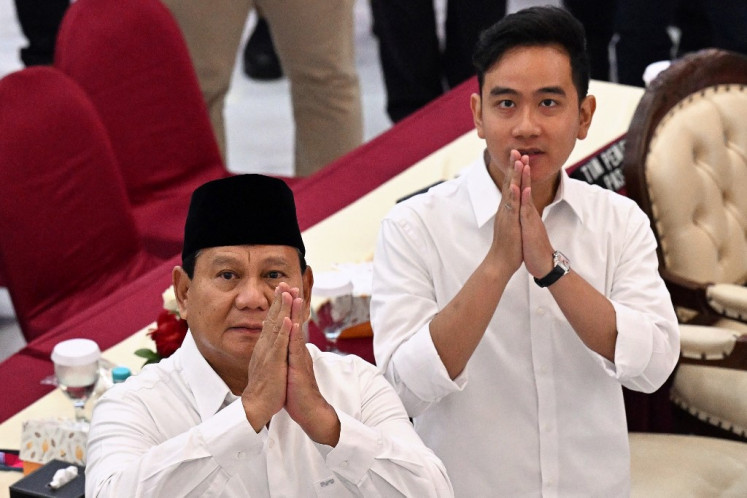Jokowi to focus on structural reform to tap growth potential
Speaking at the Bank Indonesia (BI) Annual Meeting on Thursday evening, President Joko "Jokowi" Widodo said that his priority was to unleash a structural reform agenda beyond the fiscal, financial and monetary sectors to ensure the effective achievement of the government's economic goals
Change Size

S
span>Speaking at the Bank Indonesia (BI) Annual Meeting on Thursday evening, President Joko "Jokowi" Widodo said that his priority was to unleash a structural reform agenda beyond the fiscal, financial and monetary sectors to ensure the effective achievement of the government's economic goals.
While he would focus on structural reform, Jokowi said that Finance Minister Sri Mulyani Indrawati, BI Governor Perry Warjiyo and Financial Services Authority (OJK) chairman Wimboh Santoso were fully entrusted with assessing and managing the country’s economic performance.
“Monetary and financial [matters] are [the authority] of BI and the OJK. On the fiscal side, it is the finance minister who must be prudent and careful. My work will focus outside [the fiscal and monetary authorities],” Jokowi said in his speech, delivered to an audience comprised of senior banking and finance executives.
Jokowi, formerly a mayor of Surakarta, Central Java, and governor of Jakarta, said infrastructure development would remain one of his signature policies in his second and final term. He emphasized that the development projects would connect all existing toll roads to industrial zones, tourist destinations and production centers across the country.
Jokowi added that one of the government’s immediate priorities was to seek ways to improve Indonesia’s trade balance and current account, such as the development of import-substitution and export-oriented industries.
“For example, coal could be processed into DME [dimethyl ether] and to polypropylene that could substitute our LPG [liquefied petroleum gas]. Why haven’t we done this [before]? Because we were happy with imports,” said Jokowi.
The government was also working to improve the country's investment climate as it prepared to introduce the omnibus law on job creation, which would effectively remove the barrier to investment identified in the existing 74 laws.
Meanwhile, Perry called for greater synergy between the fiscal and monetary authorities, noting that the monetary policy “should not be the only game in town” amid the increasingly gloomy global outlook.
The BI governor said during the meeting that Indonesia’s economic transformation away from its natural resource dependency, including by identifying new sources of growth, could unlock higher potential for GDP growth.
“We [should] up the ante in terms of economic transformation [toward] higher growth. We will develop new sources of growth like manufacturing, tourism, maritime [industry] and SMEs [small and medium enterprises],” he said.
The International Monetary Fund has projected global GDP growth of 3 percent this year, the lowest level since the 2008 global financial crisis.
In line with the sluggish global growth, the IMF projected the Indonesian economy to expand only 5 percent this year — a 0.2 percent cut from its April projection — before increasing slightly to 5.1 percent next year.
The Indonesian economy expanded 5.02 percent in the third quarter of 2019 amid stable household spending and positive net exports due to a steeper decline in imports, while investment showed sluggish growth. BI's latest projection sets this year's GDP growth at 5.1 percent.
Perry said that amid benign inflation and the stable rupiah, the central bank would maintain an accommodative stance in its policy mix to stoke growth.
“With BI’s accommodative policy stance, we hope banks will accelerate cutting interest rates and disbursing loans,” he said. “It’s about time that banks increased lending and encouraged production and investment.”
Publicly listed Bank Central Asia president director Jahja Setiaatmadja said that the bank was open to disbursing more loans, but that there was a lack of demand for loans from customers.
“Anytime there is a chance to disburse loans we will do so, because our liquidity is adequate and our LDR [loan-to-deposit ratio] stands at around 80 percent. We have enough capital, but it depends on demand, because we cannot [push] loans,” he said.









